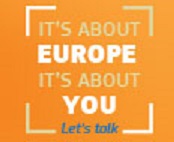The Citizens' Dialogues explained

date: 14/03/2016
How and when emerged the idea of organizing dialogues between European leaders and citizens? And for what purposes?
Joachim Ott (JO) - The motto of the Citizens' Dialogues – It's about Europe. It's about you – shows the idea behind this initiative. The President and the Members of the European Commission engage with citizens on the Political Priorities and listen to their expectations about concrete actions. With the Citizens' Dialogues, the Commissioners communicate directly with citizens all over Europe and contribute to rebuild the trust of Europeans in EU policy making and governance.
Joachim Ott
How do these dialogues work?
JO - The Citizens' Dialogues are open door events. We invite citizens from all walks of life online,through social media and multipliers to come and discuss with the Commissioners, or follow the debate in the live webstream and intervene via Twitter. Usually, we have some 300 people in the meetings and the same number of online participants. There is a short introduction by the Commissioner and one by her or his stage partner (who can be a Member of the European Parliament, a national or regional politician and sometimes a person who stands for an important aspect that will be discussed). After that, the debate is for 90 minutes based on the concrete questions and expectations of the audience. All questions are allowed and welcomed, but the area of responsibility of the Commissioner is of course interesting for the participants and we try to focus on those themes which are the most relevant for people.
Is there a particular profile of participants?
JO - We have women and men of all age groups and backgrounds in the meetings and this makes the attractiveness of the format.
What is your most significant memory of such dialogues?
JO - For many people, the most important moment is that they see a Commissioner who takes the time (and, in some regions, has the courage) to come to their town and to listen to them. The Commissioners prove that our Institution is not a bureaucracy but a political Commission which is accountable for its actions. Personally, the most beautiful moment was when we tried for the first time a Dialogue with people from all 28 Member States here in Brussels and I could see how within half a day an idea of "European-ness" emerged among people.
Citizens' Dialogues Team
With hindsight, what assessment can you make of this formula?
JO - We have tested the format since the end of 2012 and have launched it in January 2015 under the Juncker Commission. The format is attractive for the Commissioners who get a direct and unfiltered feedback from citizens, for citizens who can make their voices heard and for media that see that a European public space is emerging around these events.
What dialogues do you plan for the coming months?
JO - We will have in 2016 some 80 Citizens' Dialogues, i.e. more or less 2 per week. We would like to have been by the end of this year in all Member States and have involved all Members of the College. The big thematic priority will be on the Investment Plan (and of course the questions of growth and jobs that come with it), the refugee crisis and TTIP, but we will continue to address also all other political priorities.
